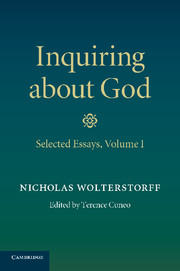Book contents
- Frontmatter
- Contents
- Editor's introduction
- Acknowledgments
- Introduction
- 1 Analytic philosophy of religion: retrospect and prospect
- 2 Is it possible and desirable for theologians to recover from Kant?
- 3 Conundrums in Kant's rational religion
- 4 In defense of Gaunilo's defense of the fool
- 5 Divine simplicity
- 6 Alston on Aquinas on theological predication
- 7 God everlasting
- 8 Unqualified divine temporality
- 9 Suffering love
- 10 Is God disturbed by what transpires in human affairs?
- 11 The silence of the God who speaks
- 12 Barth on evil
- 13 Tertullian's enduring question
- Bibliography
- Index
10 - Is God disturbed by what transpires in human affairs?
Published online by Cambridge University Press: 04 May 2010
- Frontmatter
- Contents
- Editor's introduction
- Acknowledgments
- Introduction
- 1 Analytic philosophy of religion: retrospect and prospect
- 2 Is it possible and desirable for theologians to recover from Kant?
- 3 Conundrums in Kant's rational religion
- 4 In defense of Gaunilo's defense of the fool
- 5 Divine simplicity
- 6 Alston on Aquinas on theological predication
- 7 God everlasting
- 8 Unqualified divine temporality
- 9 Suffering love
- 10 Is God disturbed by what transpires in human affairs?
- 11 The silence of the God who speaks
- 12 Barth on evil
- 13 Tertullian's enduring question
- Bibliography
- Index
Summary
The Hebrew and Christian Scriptures present God as disturbed by the sufferings we human beings undergo and the wrongs we wreak upon each other – and by the way we treat God.
God is of incomparable excellence. That excellence requires of us due acknowledgment in the form of praise, thanksgiving, love, obedience, and the like. “Ascribe to the Lord the glory due his name,” says the Psalmist (96:8). But we fail to render to God what due acknowledgment of God's worth requires. The Hebrew and Christian Scriptures present God as disturbed by this, angry. They also present God as forgiving. In presenting God as angry about, yet forgiving of, how we treat God, the Scriptures presuppose that we have wronged God. One can forgive someone only if he has culpably wronged one, and only for the wrong he has done one.
With near uniformity, the tradition of Christian theology has held that in presenting God as disturbed by what transpires in human affairs, Scripture is speaking figuratively. There is no negativity in God, none whatsoever, nor is there any passibility. Thus God is not wronged, and so is not angry at being wronged. God is invulnerably and imperturbably joyful.
Some theologians have recognized that if it is not literally true that God is wronged, then it is also not literally true that God forgives, since forgiveness is of the person who wronged one.
- Type
- Chapter
- Information
- Inquiring about God , pp. 223 - 238Publisher: Cambridge University PressPrint publication year: 2010



